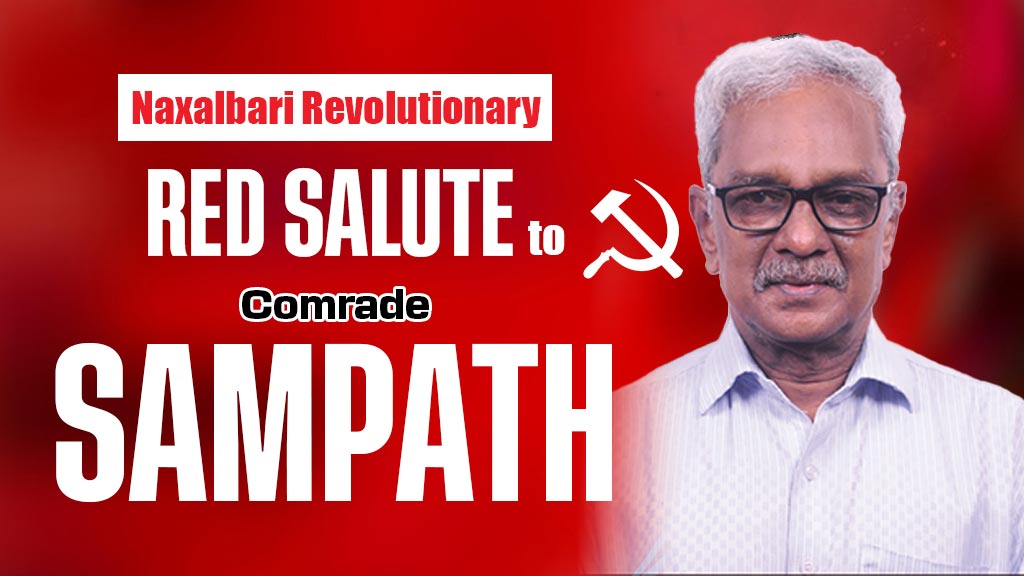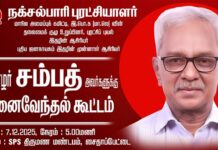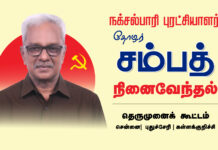
17.11.2025
Red Salute to Naxalbari Revolutionary
Comrade Sampath!
Press Release
Dear Comrades, Democratic Forces, Working People!
Comrade Kumar alias Comrade Sampath (70), a Leading Committee member of our organisation State Organising Committee, Communist Party of India (Marxist-Leninist) and editor of “Purtchi Puyal” (Revolutionary Storm) ideological magazine and former editor of “Puthiya Jananayagam” magazine, died of cancer on 17th of November, 2025 at 02:15 pm in Chennai.
Due to his long-standing habit of smoking, his respiratory tract and blood vessels had become weakened. When tried to treat this, it was discovered that cancerous tumors had already formed in his esophagus, and had reached an advanced stage; the cancer was spreading rapidly to other organs also. His lungs and blood vessels had become too weak to cooperate with the treatment undertaken. In the battle between his lungs and the cancerous tumors, the tumors quickly spread throughout his chest and ultimately claimed his life.
Comrade Sampath, who served revolutionary politics for 50 years, passionately indulged in organisational works until his health declined last October. Although he had many health issues related to old age, sciatic nerve problem, and ulcers, he never stopped his organisational works.
From the time he embraced revolutionary politics and started working as a cadre, he never considered marriage. Throughout his life, he worked tirelessly for the people and the revolution. His entire life revolved around the party, comrades and organisational work.
During 1975, when he was a college student, he actively participated in student protests against the Emergency. At that time, he accepted the report of the Western Regional Committee of the CPI (M-L) [even before the formation of the Ad-hoc Organising Committee] and entered Naxalbari politics. At that young age, he dedicated himself to revolutionary politics as a full-timer.
After the State Organising Committee (SOC) was formed, during the split in the early 1980’s, he firmly stood with the SOC and fought against the opportunistic tendency that abandoned the fundamental principles of the Naxalbari movement.
He served as the editor of the mass-based political magazine “Puthiya Jananayagam” (New Democracy) for about 30 years since its inception in 1985. When the number of comrades working in the magazine decreased and the magazine faced operational difficulties, Comrade Sampath took responsibility for all the tasks including editing, sending parcels to different regions, and managing accounts. He also promptly responded to many questions from readers and agents. It is because of his contributions, “Puthiya Jananayagam” continues to stand strong in Tamil Nadu’s political arena today. It is no exaggeration to say that the comrade is eternally present in its body and blood.
In 2020, when the neo-liquidationist mob, which was hidden in the SOC, indulged in disruptive activities, he stood by the SOC and fought firmly against the neo-liquidationists. Later in 2022, he actively participated in defeating the conspiracies and disruptive activities of the neo-anarchist mob.
Due to the right deviation tendency in the SOC, the “Puratchi Puyal” (Revolutionary Storm) magazine could not be revived for more than 25 years. But in 2021, when the decision was taken to revive it, Comrade Sampath took responsibility as its editor. His tireless contribution has been key to the continuous publication of “Puratchi Puyal” quarterly over the past five years.
He preserved the foundational principles of the Naxalbari movement and Marxist-Leninist ideology and diligently participated as SOC’s representative in the ideological struggles against other M-L groups. He upheld the mass line path of the SOC. He firmly fought against left extremism, right opportunism, liquidationism, and various anarchist trends prevalent in many M-L groups.
In 2023, during the ideological struggles within our organization, rejecting the neo-anarchism that was framed in the 1980’s as “Path of Indian Revolution – Protracted people’s war”, and redefining it as the path of Insurrection; rejecting the neo-anarchist trend of permanent election boycott and considering elections as a form of struggle; defeating the neo-anarchist perspective that was prevalent in our strategical-tactical viewpoint; and correcting mistakes in our 2021 definition of Indian fascism—he strived to protect the Marxist-Leninist foundations without any deviation, and fought firmly for that cause.
He never tolerated imperialists or ruling class supporters. He was never swayed by grandiose words or gimmicks. He ruthlessly criticized attacks on the working class and State violence on revolutionaries. His articles in “Puthiya Jananayagam” and “Puratchi Puyal” stand as testimonies to this.
One can always ask comrade for clarification on any matter. He had very clear and detailed knowledge on many aspects including current affairs and historical events. It could be the history of the Russian revolution; it could be the best film of a country; it could be internationally significant matters related to music; or it could be about a specific ethnicity, culture, customs, or language of a country’s people… Whatever the topic, one could discuss and learn from him. He continuously developed his interdisciplinary knowledge.
He was a person with an appreciation for art, literature, and aesthetics. He could explain the history of the Soviet Union’s war song “Katyusha” and its essence—the patriotism it expresses. He could also explain why the song “Balleilakka” from the movie “Sivaji” gained worldwide fame.
Whenever one speaks to him, his speeches will make us realize how vast the world we need to know truly is.
His contribution in encouraging young comrades was immense. He had the nature to easily mingle with everyone from children to the elderly. He possessed an excellent memory. He would inquire and learn about the comrades known to him and their close relations’ specific problems, and rights and wrongs. He would always check on their well-being without forgetting them.
He did not keep anything for himself. He lived simply with just a shirt or two and a pant. He would not spend on unnecessary things. He had the habit of keeping proper accounts even for small expenses; he set an example of self-discipline for others to follow.
From him, one could learn the high virtues of discipline and perfection. Although the irresponsibility and disorderliness of the younger comrades made him very angry, he actively worked to correct them. Moreover, he possessed patience and calmness naturally.
Though he was involved in revolutionary politics for fifty years, till his end, he never revealed his native place or relatives to anyone, and no one knew about them. From the time the organization started calling him “Sampath,” he became “Comrade Sampath”. When he became ill and required medical care, the necessity for an “Aadhar” card arose and it was then that his birth date and other details became known. That shows how tightly he upheld organizational discipline.
He was born in Chennai as the son of Saraswati and Sivasamy on October 17th, 1956. He had told a few times that he had an elder brother, but he never tried to meet him. He always loved organizational work and revolutionary life. He treated comrades as his family and relatives.
The above-mentioned are only key aspects of his communist qualities and contributions to the revolution. Party documents compiled during the early 1980’s and subsequently translated books showcase his contributions across various fields. Despite such contributions, he never elevated himself above others; a remarkable trait of his.
He depended more on beedi / cigarettes, and tea than on food. He considered healthcare unnecessary and avoided it. During our struggle to change this inappropriate habits and perspective of his, the disease ‘won’ resulting in his demise.
As a model of communist ideals and sentiments, lifelong focus on revolutionary work and serving the people, his body is being donated to a government medical college for research purposes. Through this, we believe that his body will be of maximum benefit to the society.
Comrade Sampath was the first leadership committee member to pass away during his tenure in SOC. A week-long mourning is being observed following his death.
Communist philosophy is like a clear stream; it must adapt to all societal conditions, develop appropriate stances, and adjust to evolving circumstances; only by bringing in young generations into the party can this be achieved rapidly—he constantly emphasized this. We practiced these principles as an example during his time in SOC. He joyfully welcomed the joining of young cadres in the organisation. Though he passed away, our struggles to realize his dream continue.
For fifty years, comrade Sampath dedicated himself to the Naxalbari revolutionary politics and its growth, enduring harsh struggles. His memories will remain a shining star in the history of the Naxalbari movement and the Indian revolution! By adhering to his revolutionary qualities, we pledge to achieve the Indian revolution!
Red Salute to Comrade Sampath!
State Organising Committee,
CPI (M-L),
Tamil Nadu.




Red salutes to Comrade Sambath!
And very much thanks to the party to share the obituary in English.
I believe this is a move to let the revolutionaries other than Tamils to learn about com.sambath.
I welcome.
But, you have done a very under estimated job here.
As per my knowledge, no revolutinary magazine had printed more than 500 copies and had not survived more than a hand full of years.
On the other side, Puthiya Jananayagam (New Democracy -Tamil) edited by com.Sambath got a circulation of more than 20k. And also for 4 decades.
Pu.Ja. is the symbol of revolution in Tamil nadu.
All thanks to com.Sambath.
Red salutes to com.Sambath.
// As per my knowledge, no revolutinary magazine had printed more than 500 copies and had not survived more than a hand full of years.
On the other side, Puthiya Jananayagam (New Democracy -Tamil) edited by com.Sambath got a circulation of more than 20k. And also for 4 decades.
Pu.Ja. is the symbol of revolution in Tamil nadu. //
ஆதி, மேற்கண்ட தங்களது இந்த கருத்து மிகவும் சரியான கருத்தாகும்.
ஆம், புதிய ஜனநாயகம், தமிழ்நாட்டில் புரட்சியின் அடையாளம்.
அதன் ஆசிரியராக, தோழர் சம்பத் இருந்த காலத்தில் 20,000 படிகளுக்கும் அதிகமான அளவில் புதிய ஜனநாயகம் தமிழ் வாசகர்கள் மத்தியில் சென்று கொண்டிருந்தது.